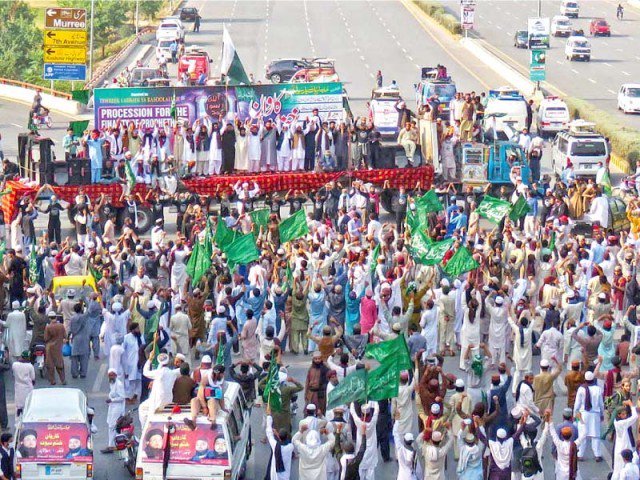News Analysis |
The deadlock between the Islamabad Capital Territory (ICT) administration and the protesters of Khatam-e-Nabuwat sit-in remain unresolved despite all efforts made by the government. The ongoing protest in the federal capital is greatly impacting the daily life of the people. The protest demonstrates how a religiously or politically motivated small group of people can disturb the functioning of the government in Pakistan.
A group of protesters, numbering 400 to 500, camped on the outskirts of the capital as the Islamabad Capital Territory Administration officials engaged in parleys, trying to convince the protesters to agitate in the Parade Ground rather than in the Red Zone. The offer was declined by the leaders of the rally.
The move came even as the police kept the capital’s Red Zone sealed on Wednesday.
The TLYR has unleashed the current protest to spread its narrative and ensure maximum mass support in order to gain a respectable turn-out in the upcoming elections in 2018.
The rally has been organized by the Tehreek Labbaik Ya Rasoolallah (TLYR), which is a newly formed religious political party, gaining popularity amongst religious minded people. The participants of the rally led by Dr Ashraf Asif Jilali, a firebrand scholar, arrived from Lahore via GT Road to protest and compel the government to take stern action against those “who have hurt the sentiments of Muslims” by making some ‘radical’ changes in the declaration form of electoral candidates. They also called for the removal of Punjab Law Minister Rana Sanaullah for making ‘irresponsible and un-Islamic remarks’ about the Amehdiya community
Read more: Aggression in the region: Islamabad all-set to draw support against the…
The rally was started from Lahore and they stayed the night at Rawat T-Chowk where the participants staged a sit-in after getting the news that the capital administration and police erected barricades at the Soan River Bridge to stop the rally from entering into the twin cities.
The Tehreek Labbaik Ya Rasoolallah (TLYR) erupted on the national stage after the hanging of Mumtaz Qadri, the assassin of Punjab governor Salman Taseer.
The markets in the Blue Area were also closed on Friday due to the security reasons. A large number of Frontier Corps (FC) and police personnel have been deployed to guard the protesters and bar them from entering the Red Zon. The protesters have set up a stage on Jinnah Avenue near China Chowk, a few hundred meters away from the Parliament House.
The authorities blocked entrances to the Red Zone, including Jinnah Avenue, with containers to keep the rally away since the organizers had announced they would storm the sensitive zone. The Metro Bus service was also closed which has added to the problems for commuters in the area. Hundreds of government employees, particularly those whose offices are located in the Red Zone, faced immense difficulties, first in reaching their destinations and then leaving their offices in the evening. Owing to the closure of Jinnah Avenue, other thoroughfares in the capital saw immense traffic congestion.
Read more: World is Changing: Chinese celebrating New Year in Islamabad
The protest by the rather small group seems to have evoked a strong government response. There was a near blackout of the groups protest by the TV news media as well as the English newspapers. However, the protest was given ample coverage in the Urdu newspapers. There has been the criticism of the government policy; some have blasted the government for taking unnecessary heavy measures like sealing roads in order to obstruct such a small group of protesters. Others have, however, censured the government for showing such softness to a “ragtag” group in comparison to their heavy-handedness with the activists protesting in a democratic way during the 2016 Panama scandal shutdown.
The rally was started from Lahore and they stayed the night at Rawat T-Chowk.
Furthermore, the extreme measures taken by the government have also caused unfortunate loss of life in the capital. Two young men died early on Friday morning when their sports bikes rammed into a concrete traffic barrier, placed by the Islamabad Traffic Police to block the road for the Khatam-e-Nabuwat rally, near Jinnah Avenue.
The Tehreek Labbaik Ya Rasoolallah (TLYR) erupted on the national stage after the hanging of Mumtaz Qadri, the assassin of Punjab governor Salman Taseer. Capitalizing on the outcry over the punishment of a murder by some sections of the Pakistani Barelvi school of thought, this group was formed to safeguard the laws pertaining to “Khatam-e-Nubawat” in the country and to enforce the Shariah in its true spirit. The same group staged a similar protest albeit on a larger scale right after the death of Mumtaz Qadri.
Read more: Ahmed Noorani Attack: Media & Politicians condemn but speculations continue..?
Led by the rabble-rouser scholars like Dr.Asif Jalali, Khadim Hussain Rizvi, and Sunni Tehreek leader Sarwat Qadari, the TLYR performed quite astonishingly well in both the NA-120 and NA-4 by-elections and have shocked other mainstream religious parties, such as the Jamati-Islami and JUI-F, in the country.
The participants of the rally led by Dr Ashraf Asif Jilali, a firebrand scholar, arrived from Lahore via GT Road to protest.
The performance of the Tehreek Labbaik Ya Rasoolallah (TLYR) in by-elections has prompted many theories; from links to the establishment’s hidden hand to control changing political trends in the country. Impartial observers, however, view this fresh way of politics in the name of religion in a deeper and broader ideological context. A series of events in past few years from the hanging of Mumtaz Qadri to the remarks made by the Punjab Law Minister has given birth to reactionary politics of a religiously motivated class, they argue. The TLYR has unleashed the current protest to spread its narrative and ensure maximum mass support in order to gain a respectable turn-out in the upcoming elections in 2018.
Till the publishing of this article, the negotiations between the government and the TLYR could not bear any fruit despite the passage of four days.













